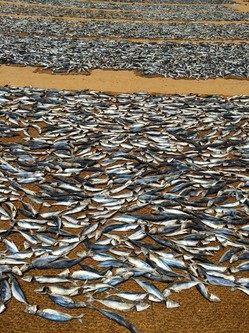The 2004 Indian Ocean tsunami wreaked havoc on coastal communities in its path. Hundreds of thousands lost lives and livelihoods. On the small island country of Sri Lanka, nearly 75 percent of its fishing fleet was destroyed, according to the Presbyterian Hunger Program and its Joining Hands partners in the region.
PHP Associate Andrew Kang Bartlett recently spent two of his eight weeks overseas in Sri Lanka, a country mostly known for its plantation economy, producing exports of Ceylon tea, rubber, and cinnamon. Its once-robust fishing industry took a downward turn from the tsunami and its aftermath. With local fishermen out of action, larger fishing operations stepped into the vacuum.
“The fishermen of Sri Lanka have had to compete with new commercial industries coming in and overfishing the region,” says Kang Bartlett. “Struggling to make it, many no longer own their boats. They’ve now been hired as labor on commercial vessels.”
During his time in Sri Lanka, Kang Bartlett met with Joining Hands partners, including the National Fisheries Solidarity Movement (NAFSO). This 12,000-member organization was launched more than 20 years ago to fight for human rights, sustainable development, and peace across the country. It has found that many fishermen are doing worse now than as independents.
“It’s sad, because they struggle so hard to make it,” he says. “Even though fishing goes back many generations, today’s fishermen want something new for their children, an education that will lead to better jobs.”
In recent years, Sri Lanka has worked to generate tourism dollars by planning the development of luxury resorts only accessible by seaplane. The planned resorts included places like the Negombo Lagoon, which provides the livelihood for more than 3,500 fishermen. Plans were to develop a base for planes to land and take off.
Fishermen and their families have been successful so far at slowing down efforts to develop landing ports. Kang Bartlett met with a group of women who had successfully defeated a government plan by arguing that the planes would kill their husbands’ businesses.
Like their counterparts in India, farmers in Sri Lanka face continuous challenges from outside corporations infiltrating their livelihood with their seeds, pesticides, and other chemicals, says Kang Bartlett. In addition to being put out of business, many farmers and residents are facing health issues that may or may not be connected with the chemicals they now need to use.
“People are dying from chronic kidney disease”, he says. “It only became an issue in the late 1990s, around the same time that glyphosate, the active ingredient in Monsanto’s Roundup, started being used as an herbicide on numerous crops. Some experts speculate there is a correlation between the glyphosate and the increase in kidney disease.”
Health experts indicate that glyphosate can increase chances of kidney problems for individuals who easily become dehydrated, such as agricultural workers in the fields. Poor drinking water containing metals such as cadmium, arsenic, and aluminum adds to the problem. The crisis led Sri Lanka’s president to order that glyphosate be banned immediately and pulled from markets around the country. The debate on that ban continues.
The statistics on numbers of people affected by the disease vary from a few thousand to more than 20,000 countrywide. Kang Bartlett met with a researcher who told him of the terrible shortage of equipment.
“There are fewer than 200 dialysis machines in the entire country,” he says. “As many as 2,000 machines are needed to meet the demands of those suffering from the disease.”
Kang Bartlett adds that the debate over the causes and how to treat those dealing with it will likely continue for years to come.
As he wrapped up his eight-week journey to both India and Sri Lanka, Kang Bartlett said there are many groups trying to respond to the struggles to improve their communities, and you see this happening around the world. He urges them—and himself—not to focus on seeing the results, but rather to value the quality of relationships, following what you know is right, and having faith in God.
“It was a sobering trip—the images of so many people sleeping on the streets and living in small shacks under such precarious conditions,” he says. “There was sadness in seeing how hard life was and is for people. But we don’t give up; we can lean on God and each other so that a vision of a beloved and healthy community will prevail.”
For more information on Kang Bartlett’s trip, go to: http://www.pcusa.org/blogs/foodfaith/2015/4/13/india.

